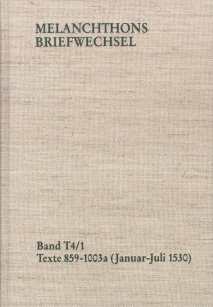Philipp Melanchthon: Band T 4,1-2: Texte 859-1109 (1530)
A high point of the history of the Reformation, the imperial diet in Augsburg in 1530, is so well represented in Melanchthon’s correspondence that it fills an entire volume. As the most influential Saxon advisors, Melanchthon stood in the very center of the action. In this way, besides the normal documents, a whole host of opinions written in common with other authors were written, bringing with them a variety of drafts in the official records and posing considerable paleographic and editorial problems. The correspondence with Luther in the Fortress Coburg has always aroused great interest, and its various copies and printings are presented here in complete form for the first time ever, edited according to the rules of modern text criticism. Other themes of this portion of Melanchthon’s correspondence include the development of the Augsburg Confession and its Apology, Melanchthon’s exploratory conversations with the opposition, the official attempts at reaching agreement in the various committees, and finally (after the imperial diet) the reevaluation of the right of resistance in connection with the formation of the Smalcaldic League.
Reviews
»The critical edition of Melanchthon Briefwechsel volume Texte 4 is a fine, absolutely useful and indispensable work for every person dealing with Philip Melanchthon.«
»Es ist schon jetzt abzusehen, dass diese vorzügliche und benutzerfreundliche Edition des Briefwechsels zu einer unentbehrlichen Quelle für alle wird, die sich mit den theologischen, politischen und persönlichen Bezügen der Reformatoren in jenem schicksalhaften Jahr beschäftigen werden: Ihre ausgezeichnete editorische Qualität verspricht ihr einen bleibenden Platz in der Forschung ebenso wie in der Lehre.«
»Den Bänden T 4,1-2 kommt insofern eine besondere Bedeutung für die historische Forschung zu, als sie die Dokumente des Jahres 1530 enthalten, welches das Jahr des Augsburger Reichstags ist. Die Editionsarbeit unter der bewährten Ägide des Hauptherausgebers Heinz Scheible ist von gewohnt hoher Qualität.«
All volumes
- Band T 1: Texte 1-254 (1514–1522) – available
- Band T 2: Texte 255-520 (1523–1526) – available
- Band T 3: Texte 521-858 (1527–1529) – available
- Band T 4,1-2: Texte 859-1109 (1530) – available
- Band T 5: Texte 1110-1394 (1531–1533) – available
- Band T 6: Texte 1395-1683 (1534–1535) – available
- Band T 7: Texte 1684-1979 (1536–1537) – available
- Band T 8: Texte 1980-2335 (1538–1539) – available
- Band T 9: Texte 2336-2604 (1540) – available
- Band T 10: Texte 2605-2865 (1541) – available
- Band T 11: Texte 2866-3126 (1542) – available
- Band T 12: Texte 3127-3420a (1543) – available
- Band T 13: Texte 3421-3779 (1544) – available
- Band T 14: Texte 3780-4109 (1545) – available
- Band T 15: Texte 4110-4529a (1546) – available
- Band T 16: Texte 4530-4790 (Januar–Juni 1547) – available
- Band T 17: Texte 4791-5010 (Juli–Dezember 1547) – available
- Band T 18: Texte 5011-5343 (Januar–Oktober 1548) – available
- Band T 19: Texte 5344-5642 (November 1548–September 1549) – available
- Band T 20: Texte 5643-5969 (Oktober 1549–Dezember 1550) – available
- Band T 21: Texte 5970-6291 (1551) – available
- Band T 22: Texte 6292-6690 (1552) – available
- Band T 23: 6691-7093 (Januar 1553-Februar 1554) – available
- Band T 24: Texte 7094-7454 (März 1554-März 1555) – available
- Band T 25: Texte 7455–7802 (April 1555–April 1556) – available
- Band T 26: Texte 7803–8142 (Mai 1556–Februar 1557) – available
- Band T 27: Texte 8143–8472 (März–Dezember 1557) – Second half of 2027
- Band T 28 – in preparation
- Band T 29 – in preparation
- Band T 30 – in preparation
- Subject Areas
- New Publications
- ---
- Critical Editions
- Abaelardus: Dialogus
- Andreae: Gesammelte Schriften
- Arnauld / Nicole: L'Art de Penser
- Böhme: Die Urschriften
- Böhme: Gesamtausgabe
- Bolzano: Gesamtausgabe
- Droysen: Historik
- Fichte: Gesamtausgabe
- Fischart: Sämtliche Werke
- Franck: Sämtliche Werke
- Frischlin: Sämtliche Werke
- Hülser: Die Fragmente zur Dialektik der Stoiker
- Harnack: Einleitung in das neue Testament
- Hauptmann: Sämtliche Werke
- Hegel: Vorlesungen über Rechtsphilosophie 1818-1831
- Herder: Studien und Entwürfe
- Jacobi: Briefwechsel - Nachlaß - Dokumente
- Locke: Anleitung des menschlichen Verstandes
- Maimon: Gesamtausgabe
- Meier: Beyträge
- Melanchthon: Briefwechsel
- Mendelssohn: Gesammelte Schriften
- Nicolai: Sämtliche Werke – Briefe – Dokumente
- Reinhold: Korrespondenzausgabe
- Reuchlin: Briefwechsel
- Reuchlin: Sämtliche Werke
- Scaliger: Poetices libri septem
- Schelling: Historisch-kritische Ausgabe
- Schelling: Münchener und Berliner Nachlass
- Schickard: Briefwechsel
- Shaftesbury (Anthony Ashley Cooper): Standard Edition
- Steiner: Schriften
- Svarez: Gesammelte Schriften
- Thomas von Aquin: De Unione
- Weigel: Sämtliche Schriften. Neue Edition
- Collected Works
- Series
- Bibliographies and Reference Books
- Allgemeine Zeitschrift für Philosophie
- AZP Beihefte
- Jahrbuch der Psychoanalyse
- JP Beihefte
- Steiner Studies
- Open-Access
- Single volumes
- eBooks
- Special Offers
- ---
- Authors
- Publishing house
- Links / Partner
- Paths to Philosophy
